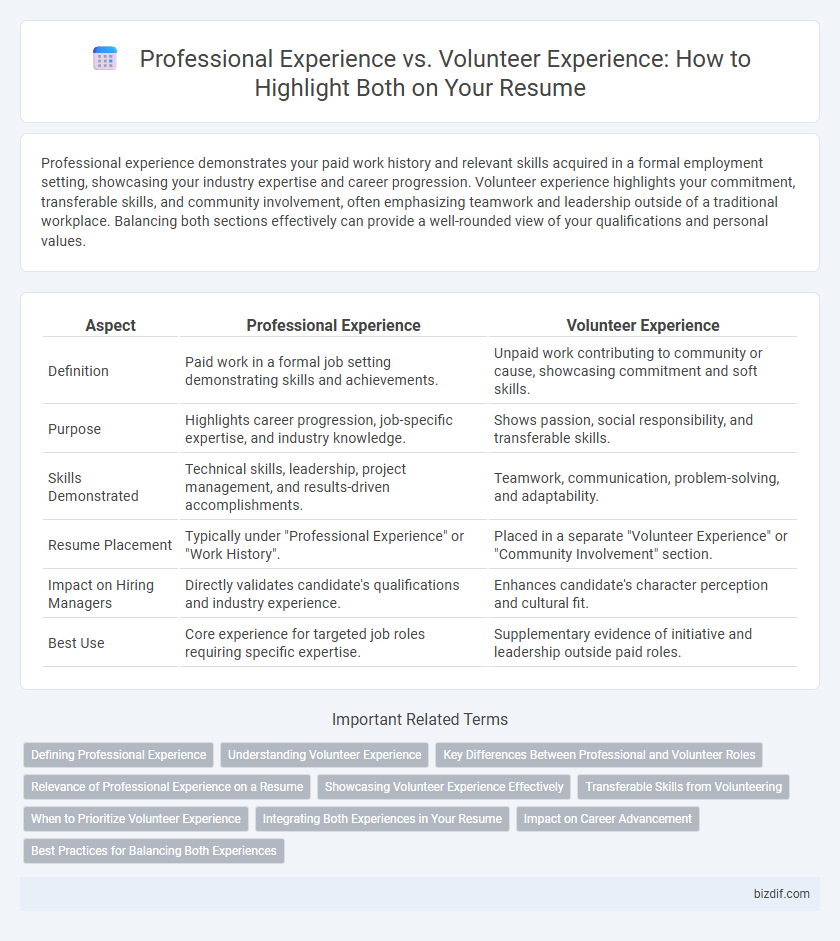Professional experience demonstrates your paid work history and relevant skills acquired in a formal employment setting, showcasing your industry expertise and career progression. Volunteer experience highlights your commitment, transferable skills, and community involvement, often emphasizing teamwork and leadership outside of a traditional workplace. Balancing both sections effectively can provide a well-rounded view of your qualifications and personal values.
Table of Comparison
| Aspect | Professional Experience | Volunteer Experience |
|---|---|---|
| Definition | Paid work in a formal job setting demonstrating skills and achievements. | Unpaid work contributing to community or cause, showcasing commitment and soft skills. |
| Purpose | Highlights career progression, job-specific expertise, and industry knowledge. | Shows passion, social responsibility, and transferable skills. |
| Skills Demonstrated | Technical skills, leadership, project management, and results-driven accomplishments. | Teamwork, communication, problem-solving, and adaptability. |
| Resume Placement | Typically under "Professional Experience" or "Work History". | Placed in a separate "Volunteer Experience" or "Community Involvement" section. |
| Impact on Hiring Managers | Directly validates candidate's qualifications and industry experience. | Enhances candidate's character perception and cultural fit. |
| Best Use | Core experience for targeted job roles requiring specific expertise. | Supplementary evidence of initiative and leadership outside paid roles. |
Defining Professional Experience
Professional experience refers to paid positions where individuals apply job-specific skills and expertise in real work environments, contributing directly to organizational goals. It includes roles with measurable outcomes, responsibilities, and often formal evaluations, highlighting career progression and industry-relevant achievements. Differentiating professional experience from volunteer experience is crucial for resume clarity, as the former emphasizes compensated work with professional development, while the latter reflects unpaid contributions often valued for soft skills and community engagement.
Understanding Volunteer Experience
Volunteer experience demonstrates transferable skills, leadership, and community engagement that enhance a candidate's profile, complementing professional experience by showcasing passion and initiative. Employers value volunteer roles for highlighting adaptability, teamwork, and problem-solving abilities in diverse settings, which often translate to workplace success. Properly framing volunteer work with quantifiable achievements and relevant skills can strengthen a resume, making candidates stand out in competitive job markets.
Key Differences Between Professional and Volunteer Roles
Professional experience typically involves paid positions where responsibilities align directly with career goals, contributing measurable impacts to an organization's objectives. Volunteer experience is generally unpaid, emphasizing community service and personal development, often showcasing soft skills like teamwork and leadership. Key differences include compensation, formal job expectations, and the primary motivation behind the role, which influences how each experience is presented on a resume.
Relevance of Professional Experience on a Resume
Professional experience holds greater relevance on a resume because it directly showcases skills and accomplishments achieved in a paid, formal work setting. Employers prioritize professional roles as they demonstrate an applicant's ability to perform job-specific tasks, handle responsibilities, and contribute to organizational goals. While volunteer experience can complement a resume, especially when aligned with career objectives, professional experience remains the primary evidence of work competence and industry expertise.
Showcasing Volunteer Experience Effectively
Volunteer experience enhances a resume by demonstrating transferable skills, leadership, and community involvement that employers value. Highlight measurable accomplishments and specific roles to showcase your impact and commitment. Integrate volunteer work that aligns with your professional goals to create a cohesive narrative and strengthen your overall profile.
Transferable Skills from Volunteering
Volunteer experience cultivates transferable skills such as leadership, communication, and project management that are highly valued in professional settings. These experiences demonstrate adaptability, teamwork, and problem-solving abilities, enriching a resume beyond traditional paid roles. Highlighting relevant volunteer roles can effectively bridge skill gaps and showcase a candidate's proactive engagement and commitment.
When to Prioritize Volunteer Experience
Volunteer experience should be prioritized on a resume when it directly relates to the desired job role or industry, showcasing relevant skills and commitment. It is especially valuable for recent graduates, career changers, or individuals with limited professional experience to demonstrate practical expertise and soft skills. Highlighting impactful volunteer roles with measurable outcomes can effectively complement or substitute traditional professional experience.
Integrating Both Experiences in Your Resume
Integrating both professional and volunteer experiences in your resume demonstrates a well-rounded skill set and commitment to community involvement, enhancing your appeal to employers. Highlight specific achievements and transferable skills from volunteer roles alongside professional accomplishments to showcase leadership, teamwork, and problem-solving abilities. Use a combined or separate section based on relevance to the job, ensuring clarity and relevance to maximize impact.
Impact on Career Advancement
Professional experience demonstrates industry-specific skills and responsibilities that directly influence career advancement through measurable achievements and leadership roles. Volunteer experience highlights transferable soft skills such as teamwork, communication, and problem-solving, which enhance a candidate's overall profile and cultural fit. Combining both experiences creates a well-rounded resume that appeals to employers seeking diverse skill sets and community engagement.
Best Practices for Balancing Both Experiences
Showcase professional experience prominently by listing relevant job titles, companies, and measurable achievements to highlight career progression and skills. Integrate volunteer experience strategically to demonstrate soft skills, community involvement, and leadership, ensuring alignment with the targeted job role. Maintain a clear, organized format with separate sections or combined chronologically, prioritizing impact and relevance to create a well-rounded resume that appeals to recruiters.
Professional Experience vs Volunteer Experience Infographic

 bizdif.com
bizdif.com